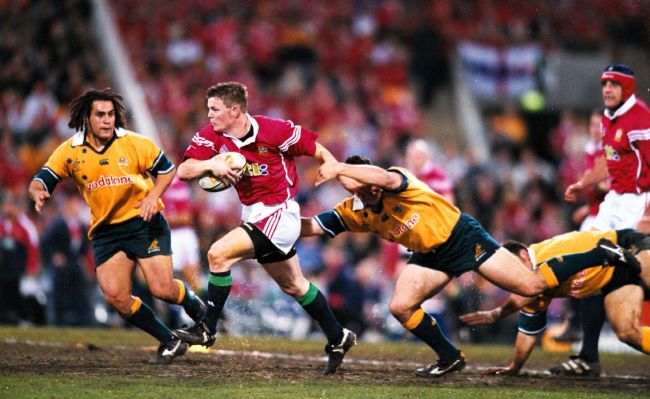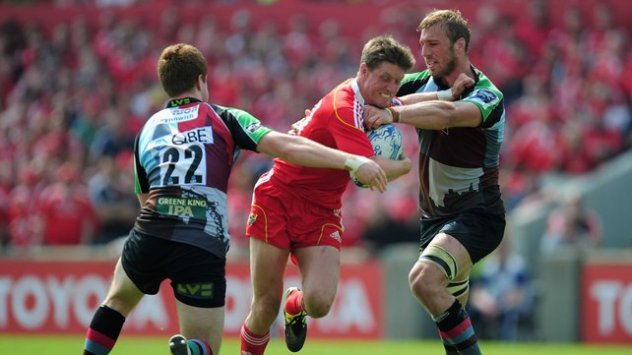 What we need in America is a renaissance. We need to go forward by going backward – Stanley Crouch
What we need in America is a renaissance. We need to go forward by going backward – Stanley Crouch
Much of the talk over the upcoming Lions series is who will captain the tour. The main nominees are Wales’ Sam Warburton, England’s Chris Robshaw as well as Ireland’s Paul O’Connell and Brian O’Driscoll.
Though it is unlikely O’Driscoll will get the captaincy, (Gatland recently admitted in an interview with Sky that he has never had a back as captain) it will be an astonishing achievement should he make a fourth successive tour with his first coming all the way back in 2001 against Australia.
However he may not be the only player who played in that particular series who takes part again this summer. One of the greatest flankers of his era, George Smith, has made himself available for selection for the upcoming events in the summer as his loan period with the ACT Brumbies has been extended.
Smith was to Australia what Richie McCaw is to New Zealand and in his prime many saw him as an equal to his All Blacks counterpart. Smith made his Wallabies debut against France in 2000 in an 18-13 victory in Paris.
By the time the Lions arrived in town Smith had three caps to his name and started all tests that summer. Australia triumphed 2-1 and Smith was named as man of the match in the decisive third test.
Following on from that success Smith also won his first and only Tri Nations tournament in the summer of 2001.
Indeed in the early 2000′s Smith feasted on silverware. In 2000 his club side the ACT Brumbies came up against the Canterbury Crusaders who were managed by the now Australia coach Robbie Deans.
Smith scored the Brumbies sole try that day but was ultimately defeated by one point on a score line of 20-19. It was the start of a fierce rivalry between the two sides.
The following season saw Smith and the Brumbies make up for the previous year’s loss as they dismantled the Sharks in that year’s final 36-6. They reached their third consecutive final in 2002 but were again beaten by the Crusaders. This time on a comprehensive score line of 31-13.
2003 saw the Brumbies fall at the semi-final stage to the Blues, but with the World Cup looming as well as being hosted in Australia; Smith had bigger fish to fry.
He crossed swords with Brian O’Driscoll once more in the group stages where both men scored their team’s tries as Australia held on for a narrow 17-16 win. Australia navigated their way to the World Cup final where they faced Martin Johnson’s England.
However the Wallabies were undone after extra time by Jonny Wilkinson and lost the final by three points, 20-17.
Smith moved on though and in 2004 the Brumbies were back where they belonged in a Super rugby final and had some unfinished business with their opposition, the Crusaders. Twice the New Zealand province had thwarted the Brumbies in the Super rugby finale since 2000. This season would be different.
The Brumbies finally overcame their great rivals and succeeded by nine points as Joe Roff and Mark Gerrard led them to a 47-38 victory.
Thereafter the Brumbies became stuck in a mire of mid table mediocrity and never really challenged for Super Rugby honours over the coming years. However Smith’s form was still outstanding and he won the Super Rugby player of the Year award in 2008.
On the other hand his old sparring partner from Ireland began to achieve his own success. Ireland won three Triple Crowns between 2004 and 2007 led by Brian O’Driscoll.
By 2007 O’Driscoll and Smith had faced off seven times on the International scene with the Aussie winning four games to O’Driscoll’s three successes.
Both Ireland and Australia had hugely disappointing World Cups that year. Ireland meekly exited at the pool stages whilst Australia was defeated once again at the World Cup by England.
After a disappointing Six Nations in 2008 Ireland travelled to Australia for their summer tour. Smith’s team came out on top again in an encounter where O’Driscoll once again scored this excellent team try;
At that point many thought O’Driscoll’s best days were over and that his body had taken too much of a beating over the years. However if Smith was swimming in silverware in the early 2000′s, O’Driscoll would soon be ready to empathise.
In 2009 he was reinvigorated, it was his own personal renaissance. He led Ireland to a coveted second ever Grand Slam whilst his province Leinster won their first ever Heineken Cup after years of trying.
The Irish team went on an unprecedented unbeaten streak. This was a streak which Australia threatened to ruin in 2009 in Croke Park. Smith was a used substitute that day as his replacement in the Aussie line-up, David Pocock, announced himself on the world stage as he wreaked havoc at the breakdown.
The game ended in a draw though as O’Driscoll touched down for a last minute try to tie the match. Smith played his last ever game in a Wallabies jersey two weeks later as they hammered Wales in Cardiff exiting the international arena with a staggering 110 caps to his name.
Smith joined Toulon in 2010 where he played over thirty games for the French side and continued his scintillating form on European soil.
Meanwhile O’Driscoll’s Leinster team began to dominate Europe with Heineken Cup successes in both 2011 and 2012. Sandwiched in between was the 2011 World Cup in New Zealand.
Ireland once more met Australia. The Wallabies were without their new talisman David Pocock for the pool clash and were simply outmuscled by the Irish. In the absence of the injured Pocock, Australia had no other quality open side flanker and Smith’s absence from the squad was hugely felt.
This brings us to the upcoming tour. Pocock has been ruled out of the series but unlike the World Cup Australia have alternatives in the Queensland Reds’ Liam Gill and the Waratahs’ Michael Hopper.
However Smith is on loan at the Brumbies, who are topping the Super Rugby table, from Suntory Sungoliath in Japan has also been in excellent form this season and is available to play in the test series.
Robbie Deans the Australia coach may have been looking to the future when he replaced Smith with David Pocock. But in a must win series against the Lions, long term plans are put to one side. Deans has to defeat the Lions or else he will be under severe pressure from the Australian press.
This blog certainly thinks that George Smith should at the very least be included in the match day squad. He is thirty two which really is not that old to be still playing high quality test rugby.
The likes of Thierry Dusautoir and Imanol Harinordoquy are both in their thirties whilst the King of Eights, Sergio Parisse is 29. Furthermore Smith would bring invaluable experience of playing against the Lions and winning against them.
This Australia team are reminiscent of the Leinster team of the early to mid 2000′s. They could almost cut any team open on their day and had an array of talented backs but when push came to shove the top teams always seemed to ground them into submission.
Smith would add so much more leadership and power to a team that has often been accused of having a soft underbelly. The Wallabies do have leaders in the form of James Horwill and the best scrum half in the world in Will Genia.
Possessing a wily and tough operator in the form of Smith though who has been around the block would be a huge asset for the Aussies.
On the other hand whilst O’Driscoll will surely make the tour, a starting berth is not so certain. A Jamie Roberts-Manu Tuilagi partnership would be a powerful one.
O’Driscoll’s experience and aura alone should guarantee him a bench spot. More importantly though he is a big game player. No player playing at the moment in Britain and Ireland can produce game changing moments like he can.
Whether it is a trademark bone shuddering hit, a sumptuous pass or a typical one metre burrow over the line the Leinster man should start.
This blog certainly thinks he should be wearing the number 13 come the first Lions Test. Whether there will be an old friend waiting for him in the opposition ranks remains to be seen.

